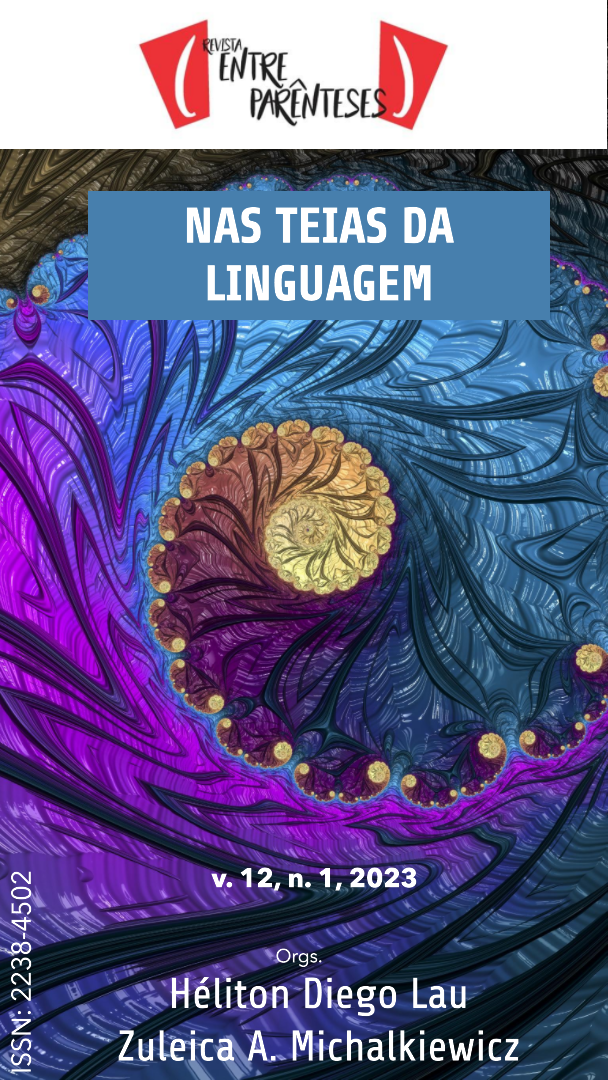METÁFORAS BRASILEIRAS DA COVID-19: UMA ANÁLISE COGNITIVO-DISCURSIVA A PARTIR DOS MEMES
DOI:
https://doi.org/10.32988/rep.v12n1.2123Keywords:
Linguística Cognitiva, Metafora, Memes, Covid-19Abstract
Stimulated by the cognitive-discursive and sociocultural bias of contemporary studies in figuration, this paper sought to observe, in memes posted on social networks, how Brazilians apprehended, processed, conceptualized and exposed their understandings about the COVID-19 virus. Through the theoretical and methodological magnifying glass of Cognitive Semantics through Conceptual Metaphor Theory and its recent developments (LAKOFF; JOHNSON, 1980; SALOMÃO, 1999; KÖVECSES, 2005; VEREZA, 2007, 2010; SEMINO, 2008; SOARES DA SILVA & LEITE, 2015; SOUSA, 2016), as well as from some works that sought to point about the uniqueness of memes for the social interaction between individuals (ZOPPI-FONTANA, 2016; ALMEIDA; SANTOS, 2020; ALMEIDA; DOS SANTOS; SANTANA, 2021) this work will seek to reflect on both the role of metaphoricity in the linguistic and textual architecture of the selected corpus, and its importance so that the audience of memes can feel impacted by them, thus incorporating and developing various emotions, sensations, and subjectivities. This contribution will point to the character of figurative language as a true human heritage of expression and communication.
References
ALMEIDA, A.; SANTOS, E. CIÊNCIA, OPINIÃO E FAKE NEWS EM TEMPOS DE CORONAVÍRUS: CONCEPTUALIZAÇÕES EM MEMES SOB A ABORDAGEM DA LINGUÍSTICA COGNITIVA. Pensares em revista, v. 19, p. 56-76, 2020.
COELHO, A. Brace yourselves, memes are coming: formação e divulgação de uma cultura de resistência através de imagens da internet. Dissertação de Mestrado. Campinas-SP, Labjor-UNICAMP, 2014.
KOCH, I.. Linguagem e cognição: a construção e reconstrução de objetos-de-discurso. Veredas - Revista de estudos linguísticos, Juiz de Fora: UFJF, v. 6, n. 1, pp. 29-42.
KÖVECSES, Z. Metaphor in culture: universality and variation. Cambridge: Cambridge University Press, 2005.
LAKOFF, G.; JOHNSON, M. Metaphors we live by. Chicago: University of Chicago Press, 1980.
LEPESQUEUR, M.; ALMEIDA, R.; SILVA, L.; TENUTA, A. O uso de metáforas e metonímias por pacientes esquizofrênicos à luz da Teoria da Metáfora Conceptual. Ciências e Cognição, 22, 2017, p. 63-92.
SALOMÃO, M. A questão da construção do sentido e a revisão da agenda dos estudos da linguagem. Veredas. Juiz de Fora, v. 3, n. 1, p. 61-79, 1999.
SARDINHA, T. Metáfora. São Paulo: Parábola, 2007.
SEMINO, E. Metaphor in discourse. Cambridge: Cambridge University Press, 2008.
SOARES DA SILVA, A.; LEITE, J. 35 anos de Teoria da Metáfora Conceptual: Fundamentos, problemas e novos rumos. Revista Investigações, Recife, v. 28, n. 2, p. 1- 23, jul. 2015.
SOUSA, A. Metáfora: uma abordagem neurocognitiva. In: ALMEIDA, A.; SANTOS, E. (Orgs.). Linguagens e cognição. Salvador: EDUFBA, 2016.
TOMASELLO, M. Origens culturais da aquisição do conhecimento humano. (C. Berliner, Trad.) São Paulo: Martins Fontes. 2003[1999].
VEREZA, S. Metáfora e argumentação: uma abordagem cognitivo-discursiva. Linguagem em (Dis)curso, v. 7, n. 3, p. 487-506, 2007.
VEREZA, S. O lócus da metáfora: linguagem, pensamento e discurso. Cadernos de Letras da UFF, n. 41, p. 199-212, 2010.
ZOPPI-FONTANA, M. Argu(meme)ntando: Argumentação, discurso digital e modos de dizer. [Apresentação em Power Point]. In: Seminário Internacional de Estudos sobre Discurso e Argumentação (III SEDiar). UFS. São Cristóvão, 2016. Disponível em: https://vdocuments.com.br/reader/full/argumementando-argumentao-discurso-digital-e-mementandopdfargumentao-e Acesso em: 20 de set. de 2021.
Downloads
Published
How to Cite
Issue
Section
License
Os direitos autorais para trabalhos científicos são do autor, com direitos de primeira publicação para a revista. Como esta é uma revista eletrônica de acesso público, os artigos são de uso gratuito, em aplicações educacionais e não-comerciais, devendo ser observada a legislação sobre direitos autorais, em caso de utilização dos textos publicados nesta revista.
- Autores mantém os direitos autorais e concedem à revista o direito de primeira publicação, com o trabalho simultaneamente licenciado sob a Licença Creative Commons Attribution que permite o compartilhamento do trabalho com reconhecimento da autoria e publicação inicial nesta revista.
- Autores têm autorização para assumir contratos adicionais separadamente, para distribuição não-exclusiva da versão do trabalho publicada nesta revista (ex.: publicar em repositório institucional ou como capítulo de livro), com reconhecimento de autoria e publicação inicial nesta revista.
- Autores têm permissão e são estimulados a publicar e distribuir seu trabalho online (ex.: em repositórios institucionais ou na sua página pessoal) a qualquer ponto antes ou durante o processo editorial, já que isso pode gerar alterações produtivas, bem como aumentar o impacto e a citação do trabalho publicado


